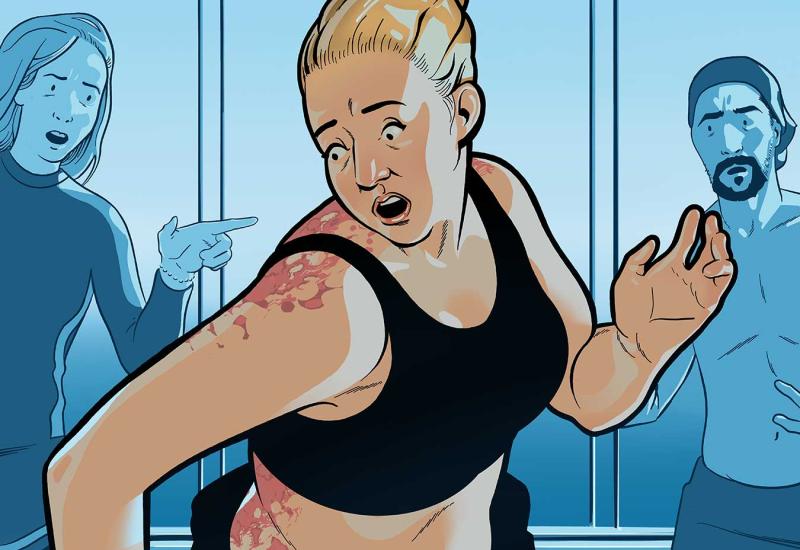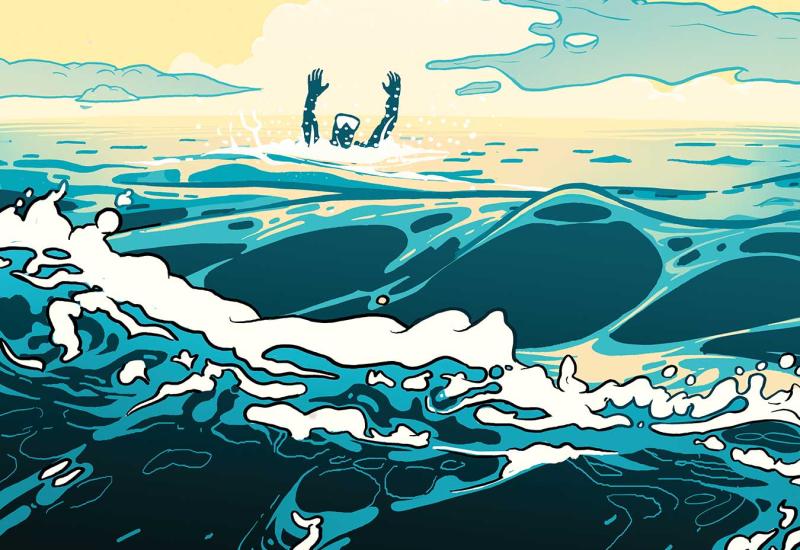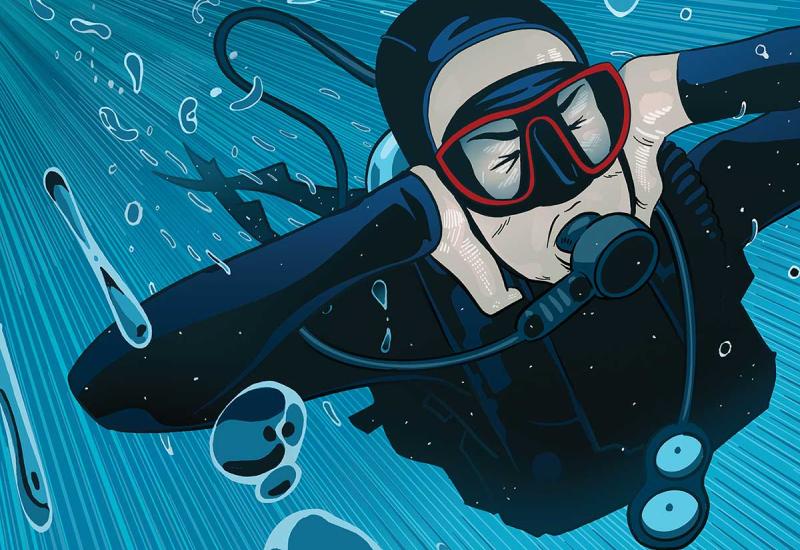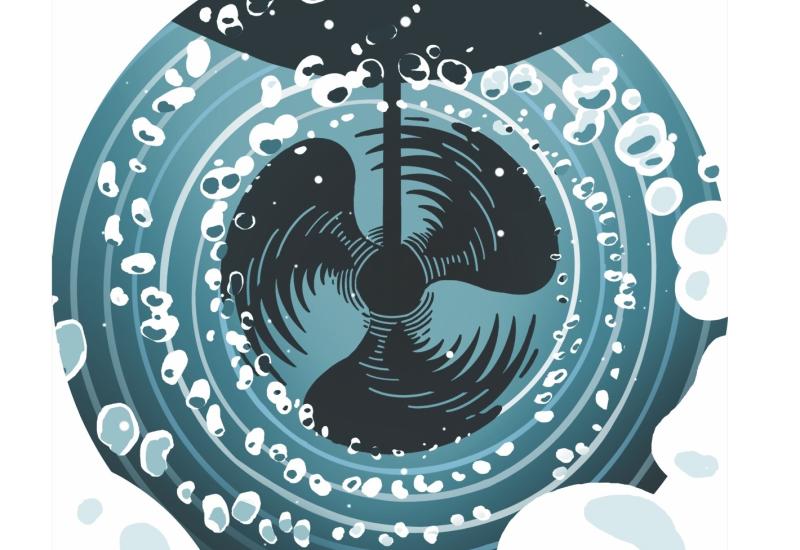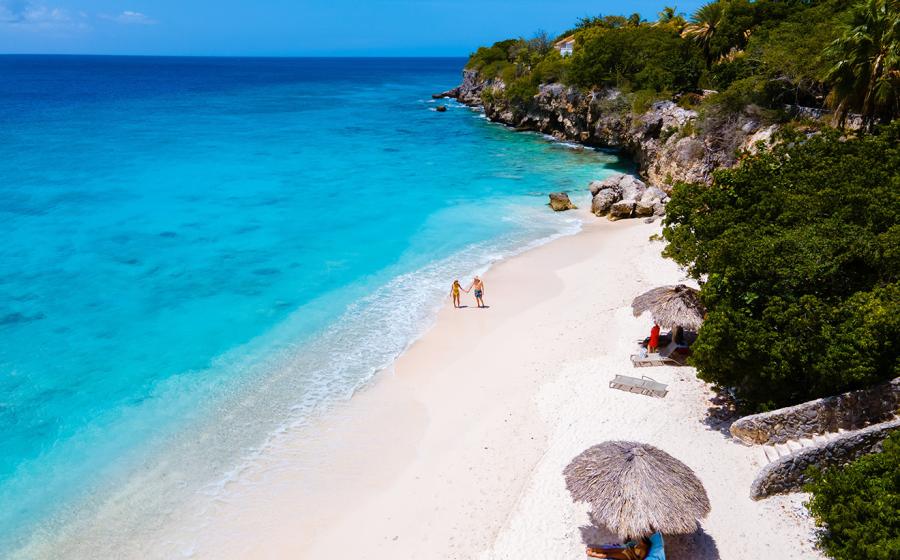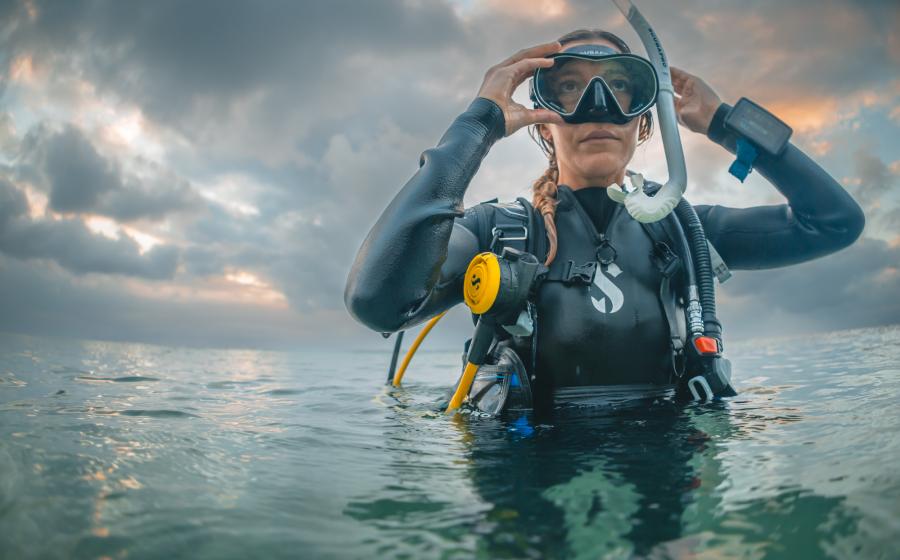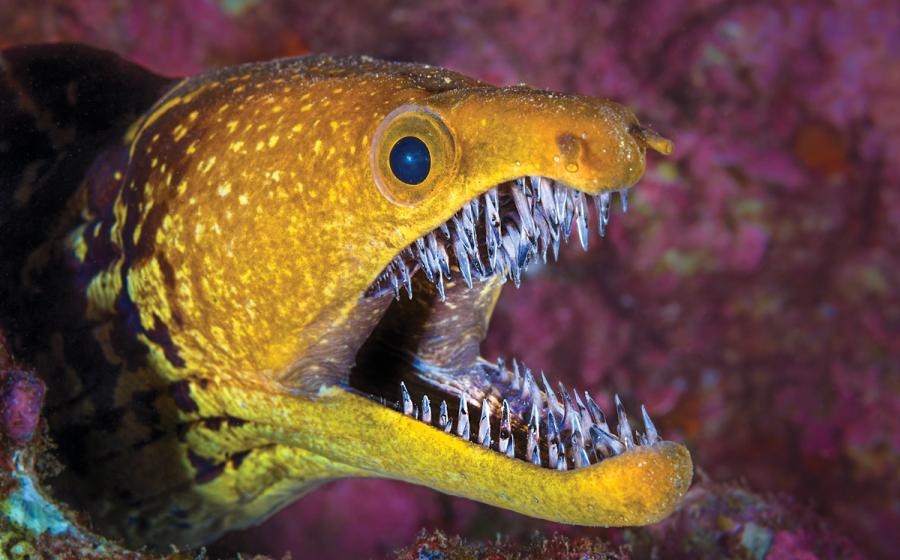Fear and Loathing

Photograph by Stephen Frink
The ocean felt like it was crushing her. The BC and wetsuit she was wearing seemed to be strangling her. And the harder Sandra tried to breathe from her regulator, the less air she got. With trembling hands, she checked her gauges--they showed plenty of air in the tank. Her regulator must not be working. Sandra felt her heart race and tried to control her rapid, shallow breathing. Where was Bill? Some buddy he is! Desperate now for air, her only thought was to get to the surface. Discarding the "useless" regulator and holding her last meager breath, she began swimming for the surface as fast as she could.
The Divers
Sandra and Bill had been together for years even though they were complete opposites. Bill was into water sports--hiking, skiing, you name it. Sandra preferred more "civilized" pursuits, like museums, movies and shopping. She tolerated Bill's activities and tried to participate when she could. Scuba diving was the latest pursuit Bill convinced her to try. Both divers were in their early 30s, in good health and had recently completed open-water training. Sandra had struggled with many of the skills, but completed extra training dives in a local quarry to earn her certification. What she never told Bill or her instructor was that she felt on the verge of panic on every dive she made.
The Dive
The divers were making their first saltwater dives at a popular tourist spot in the Caribbean. Although Sandra was very anxious, they made it through the first day of diving on a shallow reef. The second day of their trip found them diving on a reef in about 80 feet of water. Divers on the boat would later recall hearing Sandra trying to cancel the dive, but an insistent and reassuring Bill talked her into it.
The Accident
Sandra began hyperventilating as soon as the divers reached the bottom, but Bill was so engrossed in the dive that he never noticed. Sandra's anxiety level continued to build through the first five minutes of the dive as she struggled to control her breathing and keep up with the group. Eventually, she began to feel starved for air. She attempted to signal Bill several times, but never got his attention. Finally, less than 10 minutes into the dive, an irrational fear of drowning took total control of her. From a maximum depth of around 86 feet, she began struggling to reach the surface. Despite her efforts, Sandra made very little progress because she had not inflated her BC or dropped her weights. At about 60 feet, she finally thought about her BC and pushed the inflator button--holding it all the way to the surface.
The Rescue
The mate standing at the stern of the dive boat saw Sandra as she literally breached the surface, coming almost completely out of the water. He reached her in a matter of seconds and determined that she was still breathing but very confused. While the captain began tapping a recall signal on the boat's ladder, the mate towed Sandra back to the boat. On board, the confused and extremely anxious diver was immediately placed on oxygen. As soon as the other divers were back on the boat, Sandra was transported to shore and a local hyperbaric chamber. After a complete treatment schedule, Sandra fully recovered from her incident.
Analysis
Sandra's gear was inspected exactly as it came out of the water. She had nearly 1,800 psi of air remaining in her cylinder, her air was turned on fully and all of her equipment--including her regulator--worked properly. Sandra was a victim of peer pressure, poor instructional evaluation, a lack of personal responsibility and diving beyond the level of her certification. She allowed herself to be convinced to take a scuba class even though she was terrified of the water and had no desire to dive. Even after completing her open-water class, her level of anxiety remained high. After the accident, she admitted that she felt on the verge of panic every time she put on her BC, yet she continued diving in order to please Bill.
It seems unlikely that her open-water instructor could have missed Sandra's extreme anxiety, especially since she had to repeat the last two dives in order to get certified. If the instructor recognized how anxious Sandra was in the water, he should have also recognized that it was a serious threat to both Sandra's safety and the safety of anyone diving with her. He should have refused to certify her if he knew about the problem. Bill should have also recognized that pushing Sandra to take up the sport could affect both her safety and his own. Finally, Sandra should have come clean with her instructor and expressed her concerns to him. Had she taken responsibility for her own safety and honestly addressed her fears, it is possible her instructor could have helped her work through the issues.
On the day of the dive, Sandra also failed to dive within the limits of her training. Open-water divers are limited to a max depth of between 60 and 80 feet, depending upon the agency. This dive to 80-plus feet was beyond both her level of training and her level of experience. Sandra's near fatal accident was predictable and the responsibility for this near-miss is shared by Sandra, her boyfriend and the instructor.
Lessons for Life
Never push a friend to dive if they lack the skills and the comfort level necessary to be safe and enjoy the activity.
Never let anyone push you to complete a dive or to participate in training that is more advanced than your comfort level.
The only reason you need to cancel a dive is a bad feeling. Never dive if you are uncomfortable with the dive for any reason.
Never attempt to hide your anxiety from your instructor--be honest and let the instructor help you to work through your problems.
Follow the rules--the guidelines for diving are there to protect your safety. Follow them and never start a dive you are not qualified to complete.
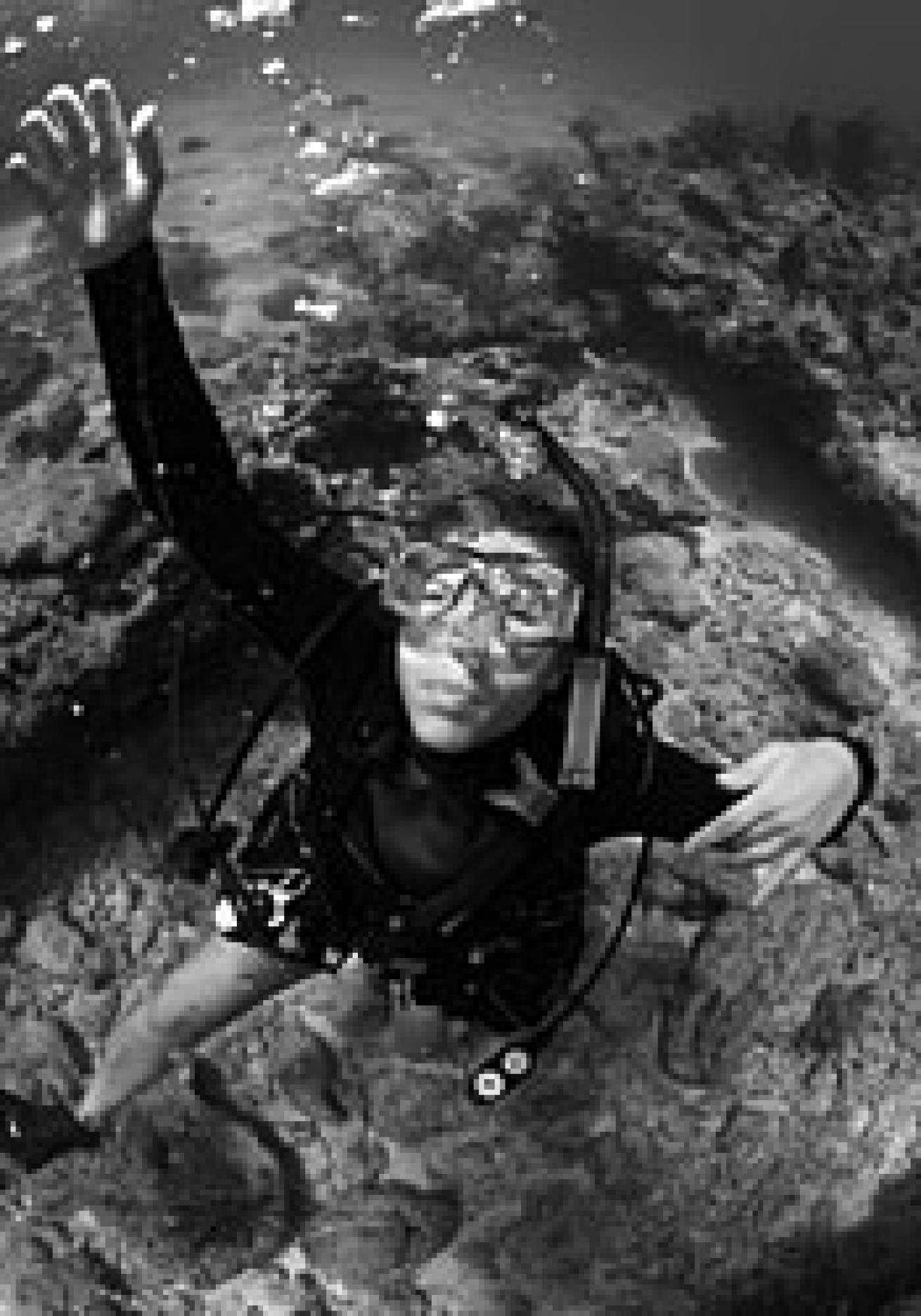
Photograph by Stephen Frink
The ocean felt like it was crushing her. The BC and wetsuit she was wearing seemed to be strangling her. And the harder Sandra tried to breathe from her regulator, the less air she got. With trembling hands, she checked her gauges--they showed plenty of air in the tank. Her regulator must not be working. Sandra felt her heart race and tried to control her rapid, shallow breathing. Where was Bill? Some buddy he is! Desperate now for air, her only thought was to get to the surface. Discarding the "useless" regulator and holding her last meager breath, she began swimming for the surface as fast as she could.
The Divers
Sandra and Bill had been together for years even though they were complete opposites. Bill was into water sports--hiking, skiing, you name it. Sandra preferred more "civilized" pursuits, like museums, movies and shopping. She tolerated Bill's activities and tried to participate when she could. Scuba diving was the latest pursuit Bill convinced her to try. Both divers were in their early 30s, in good health and had recently completed open-water training. Sandra had struggled with many of the skills, but completed extra training dives in a local quarry to earn her certification. What she never told Bill or her instructor was that she felt on the verge of panic on every dive she made.
The Dive
The divers were making their first saltwater dives at a popular tourist spot in the Caribbean. Although Sandra was very anxious, they made it through the first day of diving on a shallow reef. The second day of their trip found them diving on a reef in about 80 feet of water. Divers on the boat would later recall hearing Sandra trying to cancel the dive, but an insistent and reassuring Bill talked her into it.
The Accident
Sandra began hyperventilating as soon as the divers reached the bottom, but Bill was so engrossed in the dive that he never noticed. Sandra's anxiety level continued to build through the first five minutes of the dive as she struggled to control her breathing and keep up with the group. Eventually, she began to feel starved for air. She attempted to signal Bill several times, but never got his attention. Finally, less than 10 minutes into the dive, an irrational fear of drowning took total control of her. From a maximum depth of around 86 feet, she began struggling to reach the surface. Despite her efforts, Sandra made very little progress because she had not inflated her BC or dropped her weights. At about 60 feet, she finally thought about her BC and pushed the inflator button--holding it all the way to the surface.
The Rescue
The mate standing at the stern of the dive boat saw Sandra as she literally breached the surface, coming almost completely out of the water. He reached her in a matter of seconds and determined that she was still breathing but very confused. While the captain began tapping a recall signal on the boat's ladder, the mate towed Sandra back to the boat. On board, the confused and extremely anxious diver was immediately placed on oxygen. As soon as the other divers were back on the boat, Sandra was transported to shore and a local hyperbaric chamber. After a complete treatment schedule, Sandra fully recovered from her incident.
Analysis
Sandra's gear was inspected exactly as it came out of the water. She had nearly 1,800 psi of air remaining in her cylinder, her air was turned on fully and all of her equipment--including her regulator--worked properly. Sandra was a victim of peer pressure, poor instructional evaluation, a lack of personal responsibility and diving beyond the level of her certification. She allowed herself to be convinced to take a scuba class even though she was terrified of the water and had no desire to dive. Even after completing her open-water class, her level of anxiety remained high. After the accident, she admitted that she felt on the verge of panic every time she put on her BC, yet she continued diving in order to please Bill.
It seems unlikely that her open-water instructor could have missed Sandra's extreme anxiety, especially since she had to repeat the last two dives in order to get certified. If the instructor recognized how anxious Sandra was in the water, he should have also recognized that it was a serious threat to both Sandra's safety and the safety of anyone diving with her. He should have refused to certify her if he knew about the problem. Bill should have also recognized that pushing Sandra to take up the sport could affect both her safety and his own. Finally, Sandra should have come clean with her instructor and expressed her concerns to him. Had she taken responsibility for her own safety and honestly addressed her fears, it is possible her instructor could have helped her work through the issues.
On the day of the dive, Sandra also failed to dive within the limits of her training. Open-water divers are limited to a max depth of between 60 and 80 feet, depending upon the agency. This dive to 80-plus feet was beyond both her level of training and her level of experience. Sandra's near fatal accident was predictable and the responsibility for this near-miss is shared by Sandra, her boyfriend and the instructor.
Lessons for Life
Never push a friend to dive if they lack the skills and the comfort level necessary to be safe and enjoy the activity.
Never let anyone push you to complete a dive or to participate in training that is more advanced than your comfort level.
The only reason you need to cancel a dive is a bad feeling. Never dive if you are uncomfortable with the dive for any reason.
Never attempt to hide your anxiety from your instructor--be honest and let the instructor help you to work through your problems.
Follow the rules--the guidelines for diving are there to protect your safety. Follow them and never start a dive you are not qualified to complete.

